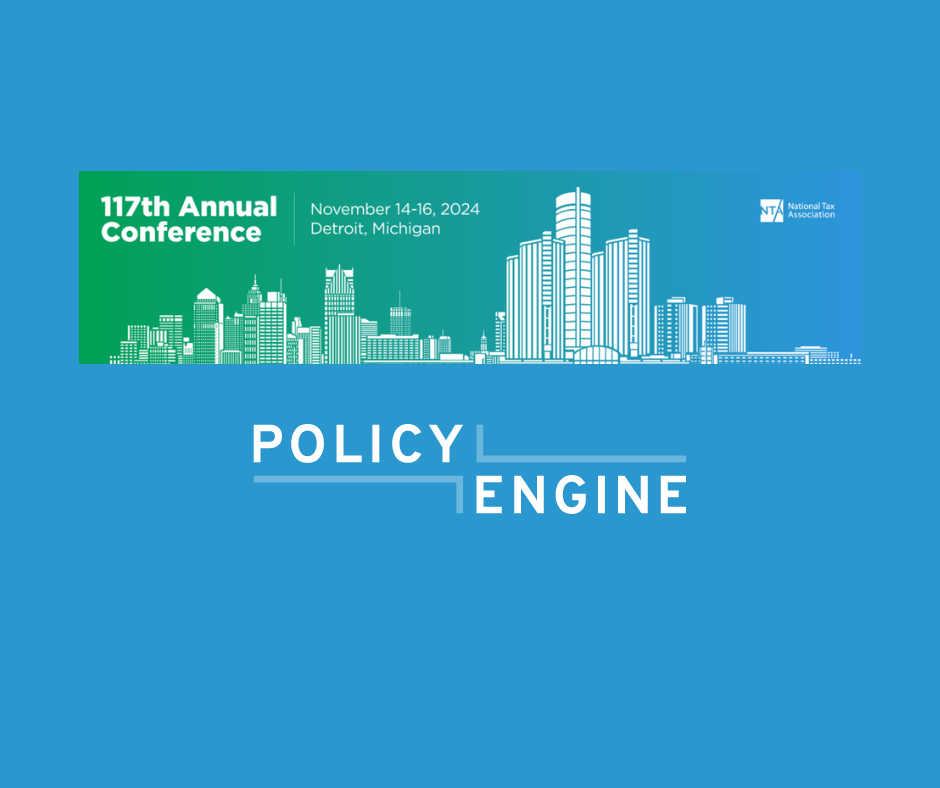PolicyEngine at the 117th Annual Conference on Taxation
Exploring AI applications and enhanced data for tax policy analysis.

Contents
1. What Can LLMs Tell Us about the ETI?
Abstract
2. PolicyEngine's Enhanced Current Population Survey for Tax-Benefit Microsimulation
Abstract
PolicyEngine Platform Showcase
PolicyEngine is proud to announce our participation in the
Presentations#
1. What Can LLMs Tell Us about the ETI?#
- Presenters: Max Ghenis, Co-founder and CEO of PolicyEngine, and Jason DeBacker, Associate Professor of Economics at University of South Carolina
- Date and Time: Friday, November 15, 2024, 9:10 AM - 9:30 AM
- Location: Richard A (Level 5, Detroit Marriott at the Renaissance Center)
- Session:
Responses to Income Taxes
Abstract#
In this study, we employ large language models (LLMs) to investigate how these AI systems perceive and simulate behavioral responses to changes in tax policies. By leveraging the economic reasoning capabilities of state-of-the-art LLMs, such as Anthropic's Claude or OpenAI's GPT models, we simulate various tax filer scenarios and analyze the LLMs' responses to policy changes, such as modifications to statutory marginal tax rates or the Earned Income Tax Credit (EITC) phase-in range.
We begin by examining how LLMs perceive and simulate behavioral responses across different tax filer situations, including primary and secondary earners, capital gains income, and single filers with children. For each scenario, we vary household income levels to test for heterogeneity across the income distribution. By comparing the LLMs' simulated responses to empirical estimates from the literature, we assess the alignment between the AI-generated perceptions and real-world observations, highlighting similarities, differences, and potential insights beyond the available literature.
Furthermore, we delve into the "reasoning" behind the LLMs' simulated responses, exploring factors such as income and substitution effects, optimization frictions, and incomplete information. By analyzing the LLMs' explanations, we gain a deeper understanding of how these AI systems perceive and model complex economic decision-making processes.
This study contributes to the growing field of AI-assisted economic research by demonstrating the potential of LLMs to provide novel insights into behavioral responses to tax policy changes, complementing and extending the existing empirical literature. Our findings have implications for policymakers, researchers, and practitioners seeking to leverage AI technologies to inform economic policy decisions and advance our understanding of taxpayer behavior.
2. PolicyEngine's Enhanced Current Population Survey for Tax-Benefit Microsimulation#
- Presenters: Max Ghenis, Co-founder and CEO of PolicyEngine, and Nikhil Woodruff, Co-founder and CTO of PolicyEngine
- Date and Time: Thursday, November 14, 2024, 9:30 AM - 9:50 AM
- Location: Marquette B (Level 5, Detroit Marriott at the Renaissance Center)
- Session:
Advances in Using Administrative Data to Measure Income Distributions and the Effects of Tax Policies
Abstract#
Microsimulation models are powerful tools for analyzing the effects of tax and benefit reforms. However, constructing representative microdata that supports modeling a broad range of policies at the federal, state, and local levels presents unique challenges. Tax records lack detailed person-level characteristics and benefit information, while survey data may not capture the full distribution across income sources.
In this paper, we introduce PolicyEngine's new enhanced microdata, the Enhanced Current Population Survey (ECPS), which leverages modern data science techniques to address these challenges. We integrate information from the IRS Public Use File into the Current Population Survey March Supplement using quantile regression forests. We then reweight the data using gradient descent to match a comprehensive set of national totals. Our validation results demonstrate that the ECPS outperforms the aged CPS and PUF in matching most administrative aggregates, coming within one percent across hundreds of targets covering demographics, income, benefits, and taxes.
To showcase the ECPS's capabilities, we assess several Child Tax Credit (CTC) reform proposals, finding that it closely reflects budgetary estimates from the Joint Committee on Taxation, while additionally providing nuanced distributional impacts.
By making this dataset openly available and providing a user-friendly interface for using and evaluating it, we aim to democratize access to high-quality microsimulation for policymakers, researchers, and the public. We discuss our methodology in detail, including the use of our new open-source Python package, survey-enhance, for data integration and reweighting. We also outline our plans for further enhancements, such as incorporating additional data sources, providing finer geographic detail, and expanding our validation efforts through comparisons with other prominent models.
PolicyEngine Platform Showcase#
- Event: Poster Session
- Date and Time: Friday, November 15, 2024, 5:15 PM - 6:30 PM
- Presenters: PolicyEngine Team
In addition to our paper presentations, we're excited to showcase the PolicyEngine platform at the conference's poster session. This will be an excellent opportunity for attendees to get hands-on experience with our tool, see its capabilities in action, and discuss potential applications for their own research or policy analysis work.
Conclusion#
We are excited to share our latest research and innovations with the tax policy community at the NTA Annual Conference. These presentations and our poster session reflect PolicyEngine's commitment to advancing the field of tax-benefit microsimulation and leveraging cutting-edge technologies to inform policy decisions. We look forward to engaging discussions and feedback from our peers in the field.
For more information about the conference or to connect with us, please visit the

max ghenis
PolicyEngine's Co-founder and CEO

nikhil woodruff
PolicyEngine's Co-founder and CTO

Subscribe to PolicyEngine
Get the latests posts delivered right to your inbox.
© 2025 PolicyEngine. All rights reserved.